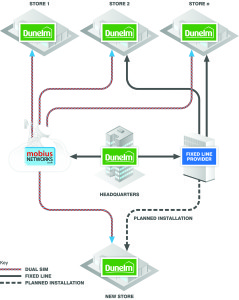
In this case study Dunelm was looking for robust resiliency for their connectivity in the event of an outage or failure of service to enable them to continue to operate.
Dunelm has been developing a sophisticated building management system for their stores. This increase in efficiency helped cut costs but meant that the connection between Head Office and their stores was used for everything; phones, payment, even the music streamed to the customers. Recognising the importance of communications and cost of failure, Dunelm installed a 4G solution which has the advantage of no common points with the fixed line system. The only was would mobile connectivity be reliable and ccan it meet the demands of a modern, complex retail store?
Proof of concept
Dunelm consulted with Mobius and Adey Electronics to explore the implementation of Mobius’ Dual SIM System and Adey’s rugged B+B Smartworx 4G Routers. This takes advantage of the very high throughput of 4G across a secure private network. This unique triple resilience offering for their stores, makes for a robust connection at a cost effective rate.
Dunelm were keen to run a Pilot to see if mobile could be used as the primary store connection. If so, then this would make new store openings much more flexible. The only way to find out was to try it; however data overage costs on a SIM normally kill such a project. Mobius therefore agreed to support Dunelm with a no overage model, for a 6 month period, to support the pilot.
The results were very promising. The pilot stage proved that stores could run on 4G with the same end user experience as fixed line. Costs were controlled effectively and supporting new store openings was a practical possibility.
Roll out
Mobius had built a secure private network using their infrastructure and the advanced routing features on the Adey 4G devices. The connection included a tariff package that supported aggregation and advance purchased pooled data. The Mobius ‘IoT’ always on profile using Three and Vodafone, means no chokes or fair usage policy, so throughput is always the best it can be.
A full roll out was green lighted by Dunelm and the system was rolled out over 150 stores across the UK. To take advantage of the flexibility of the Adey dual SIM hardware, a further upgrade has since been added where the system combines Vodafone and Three on the same site. This means that there is in effect, three systems protecting every store – Fixed line, Vodafone ‘IoT’ and Three Wholesale. Making each store more robust than before but still offering significant savings on monthly operating costs. By working in partnership the three companies built a system that incorporated the right hardware and the right configuration.
Solution

The solution supports all of the stores full services without compromise. When fixed lines are finally installed the 4G solution drops back into its role as the secondary connection without any changes being required to the hardware set up or to the tariff.
Savings are always difficult to quantify but Dunelm estimate that the savings in avoiding a sub-optimal second fixed line to every store means that their mobile solution is around 1/6th of the initial anticipated cost of the all fixed line back up plan.
Ben Ashdown, Head of IT Services, Dunelm (Soft Furnishings) Ltd, commented “The cellular backup solution gives us resilience against single points of failure which is intrinsic to fixed lines. Its flexibility also gives us the option to use cellular for “pop-up” stores, or to get a new store up and running quickly without the delay of lead times or ground works. Our successful pilot of cellular to solely run store network communications has given us the confidence to use this as an alternative to fixed lines, as required. Dual SIMs with diverse providers adds to the resilience in this scenario. These benefits, coupled with attractive commercials has proved to be a very useful solution for us.”
THE BENEFITS
• 4G means that there is no common point of failure between the three data paths, thus offering complete media resilience.
• The costs of implementation are a lot lower.
• The same infrastructure is used to support a new store opening and then form a backup system.
• The high throughput meant that stores could function the same way either running over fixed line or mobile.
• Costs are effectively controlled.
